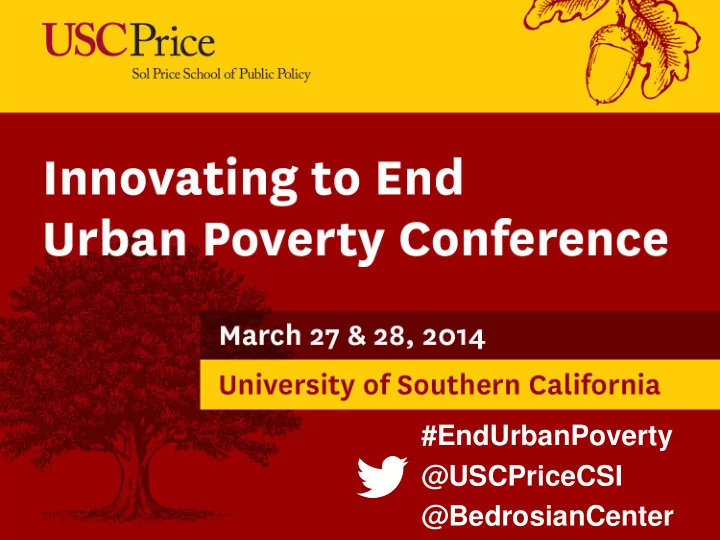

#EndUrbanPoverty @USCPriceCSI @BedrosianCenter
From War to Hope: Reinvigorating America’s Efforts to End Urban Poverty 2
50-year Poverty Trends 15% 46.5 MM 3
2013 Poverty Thresholds Source: U.S. Census Bureau | Social, Economic, and Housing Statistics Division: Poverty | Last Revised: January 28, 2014 4
% in Poverty by Age 21.8% 13.7% 9.1% 5
22%
Race and Ethnicity 7
Race and Ethnicity 8
Nativity 9
Poverty 2000 to 2012 10
Episodic Poverty 11
Poverty by Region 12
Supplemental Poverty Measure The Research Supplemental Poverty Measure, US Census Bureau, 2013 13
Supplemental Poverty Measure The Research Supplemental Poverty Measure: 2012, US Census Bureau, 2013 & The California Poverty Measure: A New Look at the Social Safety Net, PPIC 2013 14
Why Urban Poverty Persists? • Economic Factors • Social Stratification • Discrimination • Incarceration • Family structure 15
16
Source: Census Bureau 17
Employment After Recession 18
50% live in concentrated or extreme poverty Population in extreme poverty 1/3
Concentrated Poverty • Magnifies disadvantage • Neighborhood effects persist into adulthood • Children inherit disadvantage
Discrimination • Education • Employment • Housing • Sentencing
Discrimination • Education • Employment • Housing • Sentencing
Sentencing
Incarceration 28
Employment Rates 1973 2007 Young, white men 98% 91% Young, black men 96% 73% Source: Danziger and Ratner, 2010 29
2011 Poverty Rate for Children in 30
Percent of Families Headed by a Single Mother FM-1. Families, by Presence of Own Children Under 18: 1950 to Present Source: U.S. Census Bureau, Current Population Survey, March and Annual Social and Economic Supplements, 2013 and earlier. 31
Recommend
More recommend